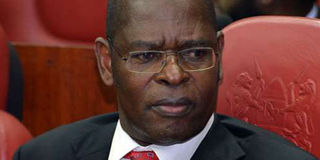We cannot afford this expensive façade we call war on corruption

Ethics and Anti-Corruption Commission (EACC) chairman Philip Kinisu before the Joint Select Committee at Parliament Buildings in Nairobi on July 25, 2016. Just like its predecessor, the Kenya Anti-Corruption Authority, EACC is founded on the fallacy that the government is willing to wage an anti-corruption crusade against itself. PHOTO | SALATON NJAU | NATION MEDIA GROUP
What you need to know:
- Clearly, as President Kenyatta insinuated, there is no longer any need for the government to bury the receipt while eating the bread.
- The World Economic Forum estimates that more than $1 trillion (Sh100 trillion) is paid in bribes worldwide every year, with the net cost of corruption exceeding $2.6 trillion.
President Kenyatta’s recent infamous statement, “endeleeni kumeza mate, lakini nyama tutakula”, reminded me of two things.
First, the very first children’s book I read 30 years ago. It had a simple story about an illiterate servant who was sent to the shop to buy bread.
On the way home he ate one of the loaves believing that his master would not notice.
However, the master looked at the receipt and noticed that one loaf of bread was missing.
Convinced that the receipt had seen him eat the bread and told his master, the next time the servant buried the receipt in the bush before eating the bread.
He then dug out the receipt and hurried home with a sense of accomplishment for having come up with this clever scheme.
Just like the illiterate servant, our governments have, over the years, become efficient at burying the receipts while siphoning the master’s (taxpayers’) money and other resources into white elephant or mega projects.
They then dig out a highway here and lay a railway line there in the hope that we will not notice the missing bread.
The worst part is that after many years of being sanitised through ethnic balkanisation, the master (the public) has altogether stopped looking at the receipts.
Clearly, as President Kenyatta insinuated, there is no longer any need for the government to bury the receipt while eating the bread.
The second thing the President’s statement reminded me of are chameleons and why our half-hearted measures to fight corruption are doomed to fail.
Chameleons have always scared the living daylights out of me.
There is something shifty about these alien-like lizards — from their eyes that can rotate independent of each other in virtually all directions to their freakish ability to change skin colour on demand and in real time.
EXPENSIVE AFFAIR
On the surface of it, this bizarre behaviour has elevated the chameleon to mythical status in many cultures.
In reality, however, it is nothing more than a survivalist ability to camouflage themselves from their prey and predator or to simply protect themselves from the damage of the sun’s radiation.
As a chemist I now understand that the underlying mechanism for their rapid colour change is a simple modification in the arrangement of extremely small (nano) crystalline materials in their skin cells to absorb and reflect light at different wavelengths.
Still, this knowledge has not liberated me from my baseless fear of chameleons.
And it is, unfortunately, the same now with corruption for most Kenyans: even if we know the purveyors of graft, we somehow still yield to our basic ethnic instincts and look the other way.
As a country that is polarised along ethnic lines, we have not only failed to recognise the inordinate cost of corruption, but we have been entrapped in the mysticism of this chameleon called the government and have thus failed to decode the mechanism behind its shades of corruption.
The World Economic Forum estimates that more than $1 trillion (Sh100 trillion) is paid in bribes worldwide every year, with the net cost of corruption exceeding $2.6 trillion.
We often pontificate on the moral implications of this kind of rot, but the real question now is whether we can even afford pillage of this magnitude.
ROUTE GRAFT
The Kenyan Government is, sadly, an accomplice to and poster child of this systemic robbery of public resources.
In the absence of a real strategy or even desire to tackle this monster, it is safe to conclude that the war on corruption has been lost before it even begun.
However, to pacify the citizens and foreign benefactors, the government has erected an amorphous smokescreen called the Ethics and Anti-Corruption Commission (EACC).
Just like its predecessor, the Kenya Anti-Corruption Authority, EACC is founded on the fallacy that the government is willing to wage an anti-corruption crusade against itself.
Not surprisingly, then, this office has become more synonymous with mediocrity and incompetence than anything else.
We should drop this anti-corruption façade that is costing taxpayers millions.
Dr Ondari is a senior research chemist in Midland, Michigan, USA. [email protected]




